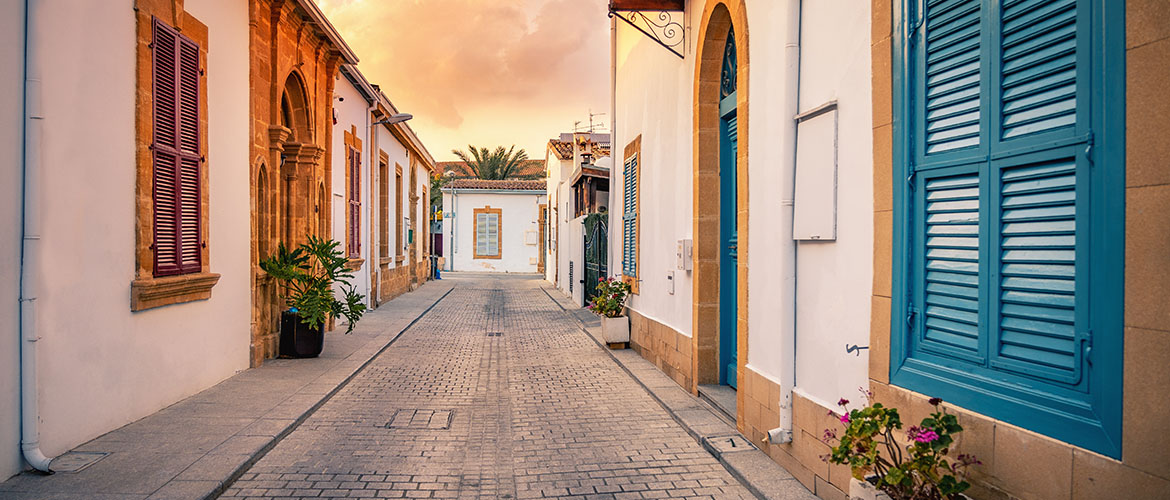Cyprus at a Glance

GEOGRAPHY AND CLIMATE
Situated in the Eastern Mediterranean, holding a favourable position that links the busy air and shipping routes of Europe, Africa, and Asia, Cyprus is the third largest Mediterranean island, both in size and population.
Cyprus has six geographical districts. Nicosia, the island’s capital, is located at the centre of Cyprus, whilst Limassol, the island’s main seaport and most populated city, is situated on the south coast.
The cities and resorts of Larnaca and Paphos, home to the island’s two airports, are also located on the south coast.
The smaller district of Famagusta, where the popular tourist resorts of Ayia Napa and Protaras can be found, famed for their spectacular beaches, is situated at the far south-eastern tip of the island.
The sixth district is Kyrenia, which covers the northern part of the island and has been occupied by the Turkish military since 1974, along with parts of Famagusta.
Well known for its warm climate, Cyprus boasts 340 days of abundant sunshine a year, with long dry summers and mild, pleasant winters. The main tourist season stretches from April to November, with ever-increasing numbers of visitors enjoying the multitude of attractions that the island has to offer. The winter season, although quieter and cooler, still attracts considerable tourism, with visitors enjoying the snow in the Troodos mountains and extensive coastline.
HISTORY AND CULTURE
Cyprus is steeped in a rich and fascinating history which dates back over 10,000 years, and its strategic geographical position has shaped the island throughout the centuries. As a crossroads and international trade route between the East and West, its rule has passed through many successive powers: The Mycenaeans, Phoenicians, Assyrians, Egyptians, Persians, Ptolemies, Romans, Franks, Venetians, Ottomans, and finally British. As a result, the island is blessed with a unique and distinctive character, which is a fusion of diverse cultural influences through the ages. Despite this, its Greek heritage still prevails.
Greek and Turkish are the official languages, with English also taught and spoken by many. Russian, French, and German are also widely spoken, due to the island's commercial links with the international business economy.
GOVERNMENT, POLITICS, AND LAW
The Republic of Cyprus has an independent, democratic presidential system, with a president and nominated council of ministers elected by popular vote, every five years.
Executive authority is held by the government and congressional authority is controlled by both the government and parliament.
Cyprus gained independence from British rule in 1960 but ties between the two countries have remained strong in economic, political, and cultural fields. After independence, much of the English legal system was retained and still applies today. The legal system is overseen by the supreme court, which is a separate and independent body and also rules on constitutional issues.

EU MEMBERSHIP & INTERNATIONAL RELATIONS
The Republic of Cyprus has been a full member of the European Union since 2004, and joined the European Monetary Union in 2008, adopting the Euro as its national currency. This was a natural decision for the island, in its pursuit to increase financial prosperity and security.
EU membership has benefited Cyprus, opening up many opportunities, and has aided its economic growth. It has become a gateway for investment into non-EU countries, including the Middle East, Russia, China, and India. The economy has also been strengthened as Cyprus continues to attract foreign enterprises and entrepreneurs wishing to invest in Europe.
Apart from EU membership, the Republic of Cyprus is a member of numerous international organizations including:
The International Monetary Fund (IMF)
The World Bank
The Commonwealth
The World Trade Organization
The Council of Europe
The United Nations
Cyprus is also represented internationally through diplomatic missions in over 40 Embassies and 118 Consulates throughout the world. There are also more than 30 Foreign Embassies and over 51 Consulates situated within the Republic of Cyprus.
INFRASTRUCTURE & TRANSPORT
Cyprus has an extremely well-developed infrastructure, with substantial investment made in recent years to enhance and modernize all transport and telecommunications networks and systems.
A modernized road network connects all areas with well-maintained highways, whilst the islands’ two international airports in Larnaca and Paphos, welcome over 4 million passengers annually, conveniently connecting Cyprus to the rest of the world.
Major work has also been carried out to connect Cyprus to other networks in the region, via satellite and fiber optic cable, helping to develop the island as a major telecommunications hub.
Due to its strategic geographical position, the island has become a favourable base for European and Far Eastern trade, and this itself gives Cyprus an influential advantage in attracting foreign investment. The discovery of fossil fuel deposits in the Exclusive Economic Zone of Cyprus is also a significant prospect to take into account, in the island's ever-evolving network.
Cyprus has two deep-sea ports, located in Limassol and Larnaca. Limassol is the islands’ principal port and offers services for passenger and freight cargo, as well as being a prominent base for international cruise liners in the region, who include Cyprus as a layover point or destination in their itineraries.
Larnaca port, currently primarily used for cargo, is due to undergo redevelopment and expansion, to become a state-of-the-art port and marina, offering a host of facilities and docking for larger ships.
There are also several marinas, situated along the coastline, the newest of which is located in Ayia Napa. This impressive development Ayia Napa Marina offers luxury apartments and villas, shops, restaurants, and quality facilities for 600 yachts.
